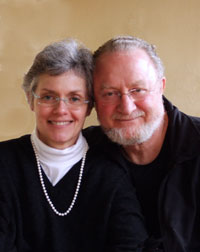The Green View /
Patricia and Conrad Cortellini
Peace with all
of creation
 (Editor’s note: This week, we begin a new bimonthly column titled “The Green View.” It is written by Patricia and Conrad Cortellini, members of Christ the King Parish in
Indianapolis.)
(Editor’s note: This week, we begin a new bimonthly column titled “The Green View.” It is written by Patricia and Conrad Cortellini, members of Christ the King Parish in
Indianapolis.)
“…Today the ecological crisis has assumed such proportions as to be the responsibility of everyone. … This not only goes hand in hand with efforts to build true peace, but also confirms and reinforces those efforts in a concrete way. When the ecological crisis is set within the broader context of the search for peace within society, we can understand better the importance of giving attention to what the Earth and its atmosphere are telling us: namely, that there is an order in the universe which must be respected, and that the human person, endowed with the capability of choosing freely, has a grave
responsibility to preserve this order for the
well-being of future generations. I wish to repeat that the ecological crisis is a moral issue… .”
— From Pope John Paul II’s message for the World Day of Peace, Jan. 1, 1990.
Our beloved Pope John Paul II delivered this message to the world in 1990.
In other passages, he prophetically described the consequences of the worsening crises. He articulated the spiritual relationship between human activity and the whole of creation.
He argued that the ecological breakdown is caused by greed and selfishness, which work contrary to the order of creation and, although he did not provide details, he described, in urgent language, what men and women of conscience must “now” do.
Remember, the “now” was nearly 20 years ago. Today, we stand two decades tardy.
Pope John Paul II died on April 2, 2005. His funeral brought together the single largest gathering of heads of state and religious leaders in history. They were joined by mourners of differing denominations numbering in excess of 4 million.
It was a beautiful and moving celebration—a ritual suited to the stature of the position and the man yet reserved, somber and respectful.
If the teachings of such a man, after 20 years, have only minimally altered the causes responsible for the ecological crisis, what can we, the average citizen, possibly do that would make a difference?
Even as we think on a global spiritual level, we can act practically on an individual local level. Many small acts can produce large consequences.
The first step is to begin to see the world through “green eyes.” We personally have practiced this perspective, and find the view of our world much improved because the world appears more hopeful even as the economic times promise to worsen.
We have begun to consider all our life choices, large and small, with respect to the impact they have on the environment, and have come to realize that many of the perceived sacrifices have turned into blessings.
We traded our lawn for a wildlife habitat, bringing nature back into our lives while eliminating chemical pollution. We walk and bicycle as often as possible, reducing our carbon emissions, cleaning the air and remaining fit and healthy longer. We stopped watching television, left our house, and got to know our neighbors. We expected drudgery and sacrifice, but what we found was beauty and belonging.
In this column, we would like to share our “Green View” so that you too may come to appreciate its beauty. Eventually, you may develop “green eyes” of your own and begin to share the experience with others.
This way we, of the Catholic faith, may come to find peace with all of creation and with God the Creator, and gain the grace to spread Pope John Paul’s urgent message beyond our family and our Church.
The ecological crisis is the responsibility of everyone. We can lead by embracing our own moral obligation, so that, even as we stand here tardy, we may help prevent the world from being too late. †
 (Editor’s note: This week, we begin a new bimonthly column titled “The Green View.” It is written by Patricia and Conrad Cortellini, members of
(Editor’s note: This week, we begin a new bimonthly column titled “The Green View.” It is written by Patricia and Conrad Cortellini, members of